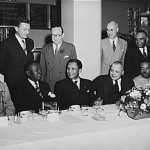 This semester I am teaching a seminar entitled Comparative Refugee and Asylum Law, and last week, one of my students in that course, Vintee Sawnhey, sent me a link to a news article about the thousands of Liberians who fear deportation from the United States because the “deferred enforced departure” status that President Bush extended to them in September 2007 is scheduled to end on March 31, 2009.
This semester I am teaching a seminar entitled Comparative Refugee and Asylum Law, and last week, one of my students in that course, Vintee Sawnhey, sent me a link to a news article about the thousands of Liberians who fear deportation from the United States because the “deferred enforced departure” status that President Bush extended to them in September 2007 is scheduled to end on March 31, 2009.
I should probably preface the rest of this long post by explaining that the article Vintee sent me was especially interesting to me because I worked with many Liberians during and just after law school, at Minnesota Advocates for Human Rights, now called The Advocates for Human Rights. Most of my work for that organization involved interviewing prospective asylum-seekers, to assess their credibility and the strength of their claims for asylum. My work there happened from late 1996 through early 1999, and many of our clients were Liberians. Minnesota has a relatively large population of Liberians. (You may want to check out the Minnesota Star-Tribune’s really nice website about Liberians in Minnesota.)
Anyway, as Vintee pointed out, the situation of these Liberians is “pretty relevant to some of our current readings” in my asylum law seminar. Indeed, the situation of the Liberians facing possible deportation later this year illustrates two of the most important ideas in the course: (1) the legal definition of “refugee” does not include people fleeing from generalized civil war conditions, and (2) offering “temporary” humanitarian protection in place of permanent refugee status to such individuals is problematic, because countries experiencing civil war do not become stable very quickly, and human beings build new lives in the meantime.


